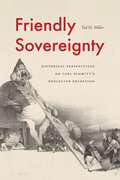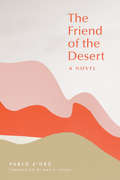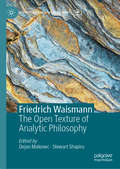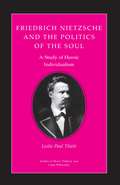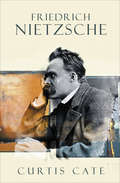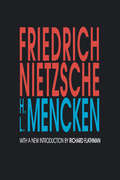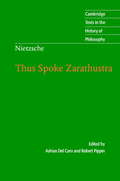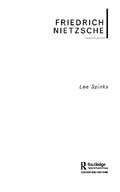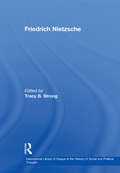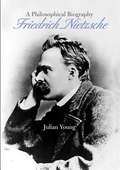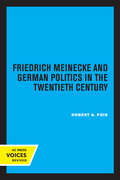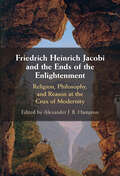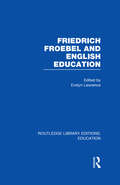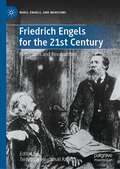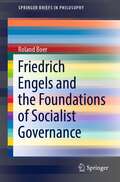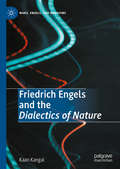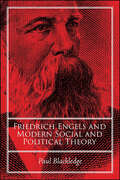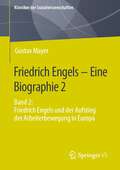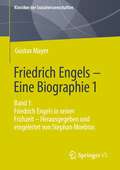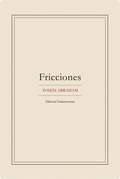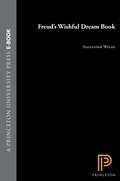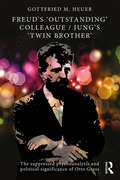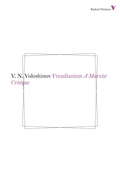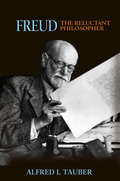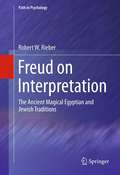- Table View
- List View
Friendly Sovereignty: Historical Perspectives on Carl Schmitt's Neglected Exception
by Ted H. MillerOver the last one hundred years, the term “sovereignty” has often been associated with the capacity of leaders to declare emergencies and to unleash harmful, extralegal force against those deemed enemies. Friendly Sovereignty explores the blind spots of this influential perspective.Ted H. Miller challenges the view of sovereignty propounded by Carl Schmitt, the Weimar and Nazi–period jurist and political theorist whose theory undergirds this understanding of sovereignty. Claiming a return to concepts of sovereignty forgotten by his liberal contemporaries, Schmitt was preoccupied with the legal exceptions required, he said, to rescue polities in crisis. Much is missing from what Schmitt harvests from the past. His framework systematically overlooks another extralegal power, one that often caused consternation, even among absolutists like Thomas Hobbes. Sovereigns also made exceptions for friends, allies, and dependents. Friendly Sovereignty plumbs the history of political thought about sovereignty to illustrate this other side of the sovereign’s exception-making power. At the core of this extensive study are three thinkers, each of whom stakes out a distinct position on the merits and demerits of a “friendly sovereign”: the nineteenth-century historian Jules Michelet, the seventeenth-century political philosopher Thomas Hobbes, and Seneca, the ancient Stoic and teacher of Nero.Analytically rigorous and thorough in its intellectual history, Friendly Sovereignty presents a more comprehensive understanding of sovereignty than the one typically taught today. It will be particularly useful to scholars and students of political theory and philosophy.
The Friend of the Desert: A Novel
by Pablo D'OrsExistential and curiously hypnotic, Pablo d'Ors evokes the sharp stylized prose of Bolaño, Bernhard, and DeLillo in this strange tale of one man's repeated forays into the desert, and the ultimate silence it contains."Thanks to the back cover of a book I knew that there lived in Brno a man who had dedicated a good portion of his life to traveling through many of the world's deserts." So begins Pavel's story, as a series of mysterious circumstances lead him to change the course of his life. On his repeated trips to the Sahara, first as part of an enigmatic organization called Friends of the Desert and later on his own, Pavel explores the drifting sands, and, ultimately, something approaching infinity. Nothing is as it seems. As the unknowns increase, each encounter presents a new mirror for Pavel's own expanding consciousness. Innumerable artists, thinkers, and mystics have paid their respects to the void. With refinement and care, Friend of the Desert inserts itself to that tradition. In the wake of Hesse's famous Siddhartha, Bolaño's By Night in Chile, and Don DeLillo's The Names, Pablo d'Ors approaches the depths and casually settles in. Friend of the Desert is a rare gift for seekers of the absolute.
Friedrich Waismann: The Open Texture of Analytic Philosophy (History of Analytic Philosophy)
by Dejan Makovec Stewart ShapiroThis edited collection covers Friedrich Waismann's most influential contributions to twentieth-century philosophy of language: his concepts of open texture and language strata, his early criticism of verificationism and the analytic-synthetic distinction, as well as their significance for experimental and legal philosophy. In addition, Waismann's original papers in ethics, metaphysics, epistemology and the philosophy of mathematics are here evaluated. They introduce Waismann's theory of action along with his groundbreaking work on fiction, proper names and Kafka's Trial. Waismann is known as the voice of Ludwig Wittgenstein in the Vienna Circle. At the same time we find in his works a determined critic of logical positivism and ordinary language philosophy, who anticipated much later developments in the analytic tradition and devised his very own vision for its future.
Friedrich Nietzsche and the Politics of the Soul: A Study of Heroic Individualism (Studies in Moral, Political, and Legal Philosophy #5)
by Leslie Paul ThieleReading Nietzsche's works as the "political biography of his soul," Leslie Thiele presents an original and accessible essay on the great thinker's attempt to lead a heroic life as a philosopher, artist, saint, educator, and solitary. He takes as his point of departure Nietzsche's conception of the soul as a multiplicity of conflicting drives and personae, and focuses on the task Nietzsche allotted himself "to make a cosmos out of his chaotic inheritance." This struggle to "become what you are" by way of a spiritual politics is demonstrated to be Nietzsche's foremost concern, which fused his philosophy with his life. The book offers a conversation with Nietzsche rather than a consideration of the secondary literature, yet it takes to task many prevalent approaches to his work, and contests especially the way we often restrict our encounter with him to conceptual analysis. All deconstructionist attempts to portray him as solely concerned with the destruction of the subject and the dispersion of the self, rather than its unification, are called into question. Often portrayed as the champion of nihilism, Nietzsche here emerges as a thinker who saw his primary task as the overcoming of nihilism through the heroic struggle of individuation.
Friedrich Nietzsche: A Biography
by Curtis Cate“An accessible, anecdotally rich” biography of the profoundly influential 19th century philosopher, author of Beyond Good and Evil and The Will to Power (Kirkus Reviews). Friedrich Nietzsche was the most fearlessly provocative and original thinker in Western history. The protean diversity of his writings make him one of the most influential of modern philosophers, yet his often paradoxical statements can be properly understood only within the context of his restless, tragic life. Physically handicapped by weak eyesight, violent headaches and bouts of nausea, this Nietzsche made short shrift of self-pity and ostentatious displays of compassion. The son of a Lutheran clergyman, whom he adored, he became a fearless agnostic who proclaimed, in Thus Spake Zarathustra that “God is dead!” Curtis Cate’s refreshingly accessible new biography brilliantly distills and clarifies Nietzsche’s ideas and the reactions they elicited. This book explores the musical and philosophical influences that inspired his thought, the subtle workings of his creative process, and the acute physical suffering he combated from his adolescence until his final mental collapse of January 1889. Cutting through the academic jargon and clearing away the prejudices that have become associated with Nietzsche’s name, Cate reveals a man whose ideas continue to have prophetic relevance and incredible vibrancy today.
Friedrich Nietzsche
by H.L. MenckenThe decisive influence of Friedrich Nietzsche on H.L. Mencken is readily acknowledged in the vast literature on the great American journalist and social critic. However, Mencken's 1908 study of the philosopher has been relegated to footnote status by Mencken's critics and biographers and has been largely ignored by Nietzsche scholars. There are good reasons for reversing this judgment. Mencken's work was one of the first comprehensive and sympathetic treatments of Nietzsche's thought in the English language. It is a provocative engagement with the German philosopher's complex and elusive ideas, enhanced by a style that reverberates with a verve and dynamism approaching Nietzsche's own.Mencken presents a view of Nietzsche that elucidates the latter's complex and contentious form of the "gospel of individualism" while evincing a keen appreciation of his unrivalled capacity for critical analysis. The historical scope of Nietzsche's thought is fully evident in Mencken's analysis as is its application to modern societies and politics. In tracing the biographical and intellectual impetus for Nietzsche's relentless attacks on conventional moralities and established modes of thought, Mencken discerned both an ideal and a method for grappling with social and cultural issues that remain salient in our own time.
Friedrich Nietzsche: Volume 16 (The\complete Works Of Friedrich Nietzsche Ser.)
by Robert B. Pippin Adrian Del CaroNietzsche regarded 'Thus Spoke Zarathustra' as his most important work, and his story of the wandering Zarathustra has had enormous influence on subsequent culture. Nietzsche uses a mixture of homilies, parables, epigrams and dreams to introduce some of his most striking doctrines, including the Overman, nihilism, and the eternal return of the same. This edition offers a new translation by Adrian Del Caro which restores the original versification of Nietzsche's text and captures its poetic brilliance. Robert Pippin's introduction discusses many of the most important interpretative issues raised by the work, including who is Zarathustra and what kind of 'hero' is he and what is the philosophical significance of the work's literary form? The volume will appeal to all readers interested in one of the most original and inventive works of modern philosophy.
Friedrich Nietzsche (Routledge Critical Thinkers)
by Lee SpinksIt is difficult to imagine a world without common sense, the distinction between truth and falsehood, the belief in some form of morality or an agreement that we are all human. But Friedrich Nietzsche did imagine such a world, and his work has become a crucial point of departure for contemporary critical theory and debate. This volume introduces this key thinker to students of literary and cultural studies, offering a lucid account of Nietzsche's thought on:* anti-humanism* good and evil* the Overman* nihilism* the Will to Power.Lee Spinks prepares readers for their first encounter with Nietzsche's most influential texts, enabling them to begin to apply his thought in studies of literature, art and contemporary culture.
Friedrich Nietzsche (International Library of Essays in the History of Social and Political Thought)
by Tracy B. StrongFrom his first readers to the present, Friedrich Nietzsche has found supporters and detractors on every point of the political spectrum. In the introduction to this volume, Tracy Strong analyzes the reasons for this diversity of reception. They are to be found, not only in modern social and political developments but, more importantly, in the purpose and style of Nietzsche's writing. The volume includes selections from all major interpretive schools, including some from the early part of the twentieth century, an appendix presenting a new translation of one of Nietzsche's most controversial writings, The Greek State, and a lengthy bibliography of writings on Nietzsche and politics. The essays gathered together in this volume are the work of the most seminal Nietzsche scholars and, taken together, provide a comprehensive study of Nietzsche's political thought.
Friedrich Nietzsche
by Julian YoungIn this beautifully written account, Julian Young provides the most comprehensive biography available today of the life and philosophy of the nineteenth-century German philosopher Friedrich Nietzsche. Young deals with the many puzzles created by the conjunction of Nietzsche's personal history and his work: why the son of a Lutheran pastor developed into the self-styled 'Antichrist'; why this archetypical Prussian came to loath Bismarck's Prussia; and why this enemy of feminism preferred the company of feminist women. Setting Nietzsche's thought in the context of his times - the rise of Prussian militarism, anti-Semitism, Darwinian science, the 'Youth' and emancipationist movements, as well as the 'death of God' - Young emphasises the decisive influence of Plato and of Richard Wagner on Nietzsche's attempted reform of Western culture.
Friedrich Meinecke and German Politics in the Twentieth Century
by Robert A. PoisThis title is part of UC Press's Voices Revived program, which commemorates University of California Press’s mission to seek out and cultivate the brightest minds and give them voice, reach, and impact. Drawing on a backlist dating to 1893, Voices Revived makes high-quality, peer-reviewed scholarship accessible once again using print-on-demand technology. This title was originally published in 1972.
Friedrich Heinrich Jacobi and the Ends of the Enlightenment: Religion, Philosophy, and Reason at the Crux of Modernity
by Hampton, Alexander J. B. Ariberto Acerbi John R. Betz Brady Bowman Benjamin Crowe James J. DiCenso George Di Giovanni Peter Jonkers Jörg Lauster Sean J. McGrath Ernst-Otto Onnasch Anders Moe Rasmussen Birgit Sandkaulen Daniel Whistler David W. WoodFriedrich Jacobi held a position of unparalleled importance in the golden age of late eighteenth and early nineteenth century intellectual history. Nonetheless, the range and style of his thought and its expression has always posed interpretative challenges that continue to hinder his reception. This volume introduces and evaluates Jacobi's pivotal place in the history of ideas. It explores his role in catalyzing the close of the Enlightenment through his critique of reason, how he shaped the reception of Kant's critical philosophy and the subsequent development of German idealism, his effect on the development of Romanticism and religion through his emphasis on feeling, and his influence in shaping the emergence of existentialism. This volume serves as an authoritative resource for one of the most important yet underappreciated figures in modern European intellectual history. It also recasts our understanding of Fichte, Hegel, Kierkegaard, and others in light of his influence and impact.
Friedrich Froebel and English Education (Routledge Library Editions: Education)
by Evelyn LawrenceThis collection of essays describes Froebel’s life and the history of his influence on the education of young children in Britain. It also traces the religious roots of his philosophy and discusses his psychological and educational principles in the light of developments in these fields since his day.
Friedrich Engels for the 21st Century: Reflections and Revaluations (Marx, Engels, and Marxisms)
by Terrell Carver Smail RapicThis edited volume presents an interdisciplinary and international revaluation of Friedrich Engels as much more than “junior partner” to Karl Marx or “second fiddle” in the Marxist orchestra. The nineteen critical essays in this collection are the work of scholars from Germany, USA, UK, Italy, China, India, Mexico and the Philippines. Together they present and evaluate archival material and scholarly commentary that covers epistemology, political economy, political theory, gender studies, cultural studies, political geography, philosophy of social science and sociological studies of class-conflict. Students, activists and specialists will find fresh consideration of familiar works, such as The Condition of the Working Class in England, The Origin of the Family, Private Property and the State, and The Dialectics of Nature. They will also be able to explore Engels’s less familiar pamphleteering, literary criticism and political commentary through detailed contextualization and careful analysis. Friedrich Engels for the 21st Century: Perspectives and Problems is unique in putting different intellectual and political receptions of Engels’s work into productive conversation, particularly from non-Anglophone scholars, translated here into English. Readers will appreciate why Engels has been so widely celebrated some two hundred years after his birth.
Friedrich Engels and the Foundations of Socialist Governance (SpringerBriefs in Philosophy)
by Roland BoerThis book states that the political systems of China, Vietnam, Cuba and other socialist countries are showing distinct maturity and ability to deal effectively with challenges – the most recent being the COVID-19 pandemic. In order to understand how they have developed their structures, it is time to return to the roots of the Marxist tradition and re-examine the question of socialist governance. It was Friedrich Engels (and less so Marx) who laid out some of the theoretical foundations for socialist governance. On the basis of extensive research in 1870s and 1880s, Engels developed his analysis of the nature of hitherto existing states as a ‘separated public power’; the role of the dictatorship of the proletariat and its exercise of power; the actual meaning of the ‘withering away of the state’, which would be one of the very last outcomes of socialist construction; and the nature of socialist governance itself. On this matter, he proposed a de-politicised public power that would stand in the midst of society and focus on managing the processes of production for the sake of the true interests of society.
Friedrich Engels and the Dialectics of Nature (Marx, Engels, and Marxisms)
by Kaan KangalReading different or controversial intentions into Marx and Engels’ works has been a common but somewhat unquestioned practice in the history of Marxist scholarship. Engels’ Dialectics of Nature, a torso for some and a great book for others, is a case in point. The entire Engels debate separates into two opposite views: Engels the contaminator of Marx’s “new materialism” vs. Engels the self-educated genius of dialectical materialism. What Engels, unlike Marx, has not enjoyed so far is a critical reading that considers the relationship between different layers of this standard text: authorial, textual, editorial, and interpretational. Informed by a historical hermeneutic, this book questions the elements that structure the debate on the Dialectics of Nature. It analyzes different political and philosophical functions attached to Engels’ text, and relocates the meaning of the term “dialectics” into a more precise context. Arguing that Engels’ dialectics is less complete than we usually think it is but that he achieved more than most scholars would like to admit, this book fully documents and critically analyzes Engels’ intentions and concerns in the Dialectics of Nature, the process of writing, and its reception and edition history in order to reconstruct the solved and unsolved philosophical problems in this unfinished work.
Friedrich Engels and Modern Social and Political Theory
by Paul BlackledgeIn this comprehensive overview of Friedrich Engels's writings, Paul Blackledge critically explores Engels's contributions to modern social and political theory generally and Marxism specifically. Through a careful examination both of Engels's role in the forging of Marxism in the 1840s, and his contributions to the further deepening and expansion of this worldview over the next half century, Blackledge offers a closely argued and balanced assessment of his thought. This book challenges the long-standing attempt among academic Marxologists to denigrate Engels as Marx's greatest mistake, and concludes that Engels was a profound thinker whose ideas continue to resonate to this day.
Friedrich Engels – Eine Biographie 2: Band 2: Friedrich Engels und der Aufstieg der Arbeiterbewegung in Europa (Klassiker der Sozialwissenschaften)
by Gustav MayerDie hier wieder zugänglich gemachte zweibändige Biographie Friedrich Engels‘ von Gustav Mayer gilt bis heute als bedeutendes Standardwerk. Neu herausgegeben von Stephan Moebius.
Friedrich Engels – Eine Biographie 1: Band 1: Friedrich Engels in seiner Frühzeit – Herausgegeben und eingeleitet von Stephan Moebius (Klassiker der Sozialwissenschaften)
by Gustav MayerDie hier wieder zugänglich gemachte zweibändige Biographie Friedrich Engels‘ von Gustav Mayer gilt bis heute als bedeutendes Standardwerk. Neu herausgegeben und eingeleitet von Stephan Moebius.
Fricciones
by Tomás AbrahamEn estos tres ensayos, Tomás Abraham argumenta y discute sobre diversos temas alejado de las trampas de conformidad habituales en la cultura argentina. El primer ensayo, «Los polacos», analiza y desarrolla el efecto de la cultura polaca en la argentina. En «Aira y Piglia», el autor describe y explica dos casos paradigmáticos de la narrativa argentina actual. El tercer ensayo, «El agujero de cristal», trabaja a partir de la comparación entre las muy diferentes concepciones del arte de Rivière y Antonin Artaud.
Freud's Wishful Dream Book
by Alexander WelshAlthough it is customary to credit Freud's self-analysis, it may be more accurate, Alexander Welsh argues, to say that psychoanalysis began when The Interpretation of Dreams was published in the last weeks of the nineteenth century. Only by going public with his theory--that dreams manifest hidden wishes--did Freud establish a position to defend and embark upon a career. That position and career have been among the most influential in this century. In August 1899, Freud wrote to Wilhelm Fliess of the dream book in terms reminiscent of Dante's Inferno. Beginning from a dark wood, this modern journey features "a concealed pass though which I lead the reader--my specimen dream with its peculiarities, details, indiscretions, bad jokes--and then suddenly the high ground and the view and the question, Which way do you wish to go now?" Physician that he is, Freud appoints himself guide rather than hero, yet the way "you" wish to go is very much his prescribed way. In Welsh's book, readers are invited on Freud's journey, to pause at each concealed pass in his seminal work and ask where the guide is taking them and why. Along the way, Welsh shows how Freud's arbitrary turnings are themselves wishful, intended to persuade by pleasing the reader and author alike; that his interest in secrets and his self-proclaimed modest ambition are products of their time; and that the book may best be read as a romance or serial comedy. "Some of the humor throughout," Welsh notes, "can only be understood as a particular kind of fine performance." Welsh offers the first critical overview of the argument in Freud's masterpiece and of the author who presents himself as guide.
Freud's 'Outstanding' Colleague/Jung's 'Twin Brother': The suppressed psychoanalytic and political significance of Otto Gross
by Gottfried M. HeuerOtto Gross was the first analyst to link his work with radical politics, connecting inner, personal transformation with outer, collective change. Since his death in 1920 his work has been suppressed, despite his seminal influence on the developing analytic discipline and on the fields of sociology, philosophy and literature. Here Gottfried M. Heuer introduces Gross’ life and ideas, using an innovative, historiographic methodology he terms trans-historical: a psychoanalytic, intersubjective, and trans-temporal approach to the past, aimed at ‘healing wounded history’ in the present. Heuer considers several previously unpublished sources to explore Gross’s ideas and legacy as well as his unusually bohemian life. His use of the anarchist concept of mutuality to develop a relational and intersubjective approach in his own analytic theory and clinical practice was unique, and his work had a lasting, yet unacknowledged, influence on Freud, Jung (with whom he had the first recorded mutual analysis) and many other analysts. His ideas were appropriated by Max Weber, the founder of sociology, and by the philosopher Martin Buber, playing a pivotal role in what we now call ‘modernity’. Heuer also explores Gross’s paradigmatic father/son battle with his father Hans, who established the science of criminology, and touches upon Gross’s links to the literary field of the early 20th century via Kafka, Werfel, et al., German expressionism and the Dada-movement, as well as the Anglo-American world through the work of D. H. Lawrence. This innovative, multi-faceted approach to Gross’s work and its influence marks a turning point, putting him firmly on the map of the historiography of analysis as well as linking this field with the neighbouring disciplines of the history of law and criminology, literature, sociology and philosophy. In addition, Gross continuing relevance for leading edge clinical and political ideas is addressed. This book will be essential reading for Jungian and Freudian analysts, psychotherapists and counsellors, academics and students of analysis, politics, history, criminology and sociology.
Freudianism
by I. R. Titunik Valentin Voloshinov Neal BrussFreudianism is a major icon in the history of ideas, independently rich and suggestive today both for psychoanalysis and for theories of language. It offers critical insights whose recognition demands a change in the manner in which the fundamental principles of both psychoanalysis and linguistic theory are understood. Volosinov went to the root of Freud's theory adn method, arguing that what is for him the central concept of psychoanalysis, "the unconscious," was a fiction. He argued that the phenomena that were taken by Freud as evidence for "the unconscious" constituted instead an aspect of "the conscious," albeit one with a person's "official conscious."For Volosinov, "the conscious" was a monologue, a use of language, "inner speech" as he called it. As such, the conscious participated in all of the properties of language, particularly, for Volosinov, its social essence. This type of argumentation stood behind Volosinov's charge that Freudianism presented humans in an inherently false, individualistic, asocial, and ahistorical setting.
Freud, the Reluctant Philosopher
by Alfred I. TauberFreud began university intending to study both medicine and philosophy. But he was ambivalent about philosophy, regarding it as metaphysical, too limited to the conscious mind, and ignorant of empirical knowledge. Yet his private correspondence and his writings on culture and history reveal that he never forsook his original philosophical ambitions. Indeed, while Freud remained firmly committed to positivist ideals, his thought was permeated with other aspects of German philosophy. Placed in dialogue with his intellectual contemporaries, Freud appears as a reluctant philosopher who failed to recognize his own metaphysical commitments, thereby crippling the defense of his theory and misrepresenting his true achievement. Recasting Freud as an inspired humanist and reconceiving psychoanalysis as a form of moral inquiry, Alfred Tauber argues that Freudianism still offers a rich approach to self-inquiry, one that reaffirms the enduring task of philosophy and many of the abiding ethical values of Western civilization.
Freud on Interpretation
by Robert W RieberThis book presents new insights into Freud's famous "discovery" of the unconscious and the subsequent development of psychoanalytic theories. The authors explore the original context in which these ideas arose and the central debate about mind as matter or something that transcends matter. In the course of this examination, it is demonstrated that Freud was influenced not only by the 19th century scientific milieu, but also by ancient cultures. While it is known that Freud was an avid collector of ancient artifacts and generally interested in these older cultures, this book systematically investigates their profound effect on his thinking and theorizing. Two major influences, Egyptian mythology and Jewish mysticism are analyzed in terms of similarities to Freud's emerging ideas about the mind and its diseases. To further this line of investigation, Bakan supplies an illuminating discussion of what it means to interpret. Taken from the viewpoint that interpretation involves an u
